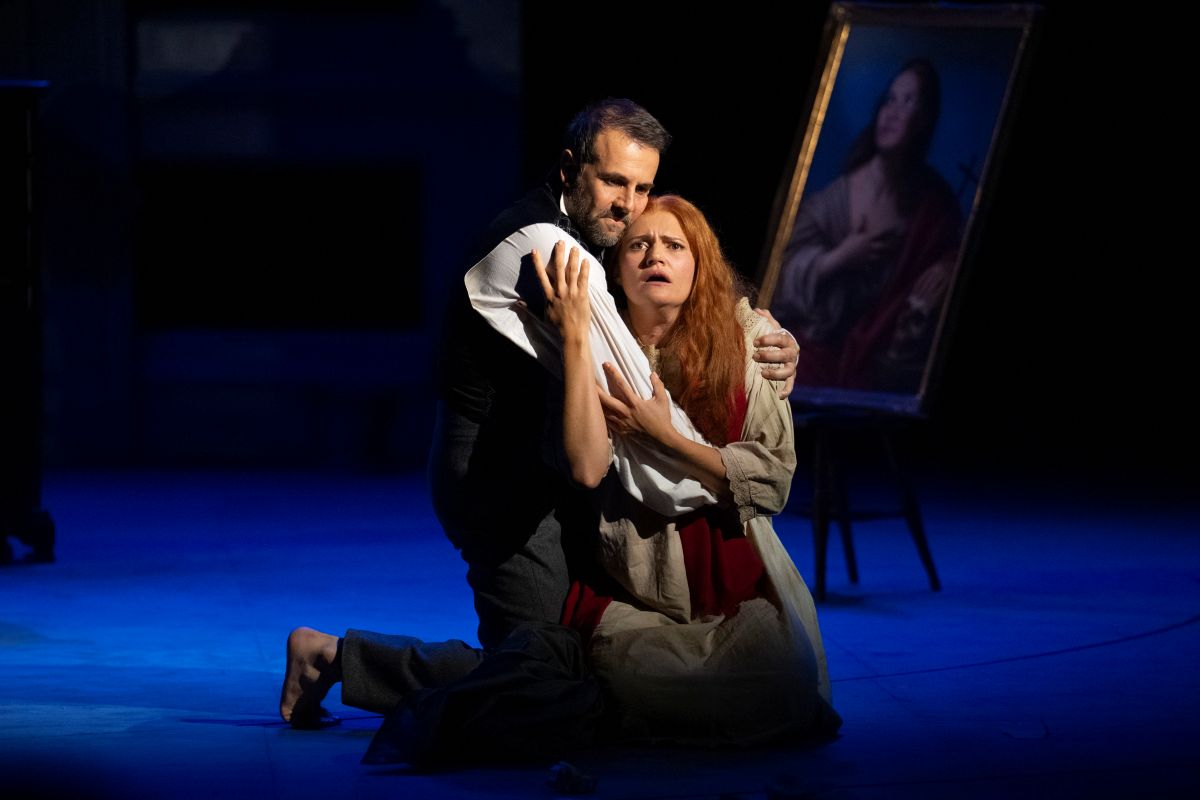This opera is Verdi’s version of the story of Marguerite Gautier, the “fallen woman” of the title of Dumas’ novelised account of his affair with the celebrated courtesan, Marie Duplessis. On the surface it is a glittering melodrama about a doomed love affair, but it incorporates a searing critique of the double standard that allows rich men to exploit poor women and to dispose of them as “used goods” – there is no “fallen man” in this Parisian demi-monde. And director Maxine Braham finds a telling way to illustrate this underpinning scandal in the way she stages the opening prelude – a young female flower seller crosses the stage followed by a streetwalker who is helped into a glittering gown by an expensively dressed man. This tableau echoes the early career of Violetta Valery, before she becomes the high-class but doomed courtesan of Act 1.
Violetta is the toast of Paris – no-one knows that she is already dying from TB. To one of her parties comes Alfredo Germont, a young and naïve poet who is in love with her. He declares his passion and, against her better judgement, Violetta is persuaded to leave Paris and set up home with him in the country. There she is visited by Alfredo’s father who tells Violetta that Alfredo’s scandalous association with her is about to destroy the marriage prospects of his sister. He urges her to give up the affair. Violetta succumbs to this blackmail and agrees to leave Alfredo though her heart is broken. Alfredo gets a farewell letter from her and, in his fury at being rejected, hurries back to Paris where he confronts and humiliates her. In the final act, Violetta is penniless and near death. Alfredo returns to seek forgiveness and renew his vows of love but it is too late.
This production in the glorious surroundings of the Grange Festival’s imposing mansion in the Hampshire countryside is of the highest standard, and blessed with a stellar performance from Samantha Clarke in the title role. She sings the demanding music of the first act with ease and panache, holding her half of Libiamo ne’lieti with the silkiest of soprano lines. And she matches this tour de force with an equally powerful and moving account of Violetta’s final moments, as if protecting Alfredo from the guilt he should feel for his betrayal. Nico Darmanin is a fine Alfredo, perhaps lacking the charisma of his Violetta, but still giving a compelling account of the naïve lover driven to the brink by the outcome of the machinations of his father. And Dario Solari as the elder Germont also seemed a little ‘low voltage’. He sang with style – I particularly liked his version of Di Provenza il Mar – but the great confrontation between him and Violetta never quite reached the pitch that can make it an “edge of seat” moment.
Apart from a ragged patch in the gambling scene at the end of Act 2, conductor Richard Farnes found a well judged palate of light and shade from the players of the Bournemouth Symphony Orchestra and showed real sensitivity to the needs of the singers. The Grange Festival Chorus was in fine form, even when obliged to deliver the two superfluous song and dance numbers at Flora’s party. In two recent versions of the opera that I have seen, they have been cut.
The director’s firm grasp of the trajectory of the story, and of the sexual politics of the status of the courtesan, made for a story well told until she let the Mary Magdalene metaphor get the better of her in the final scene. It is true that Verdi peppers his opera with many references to Violetta’s religious faith but perhaps ‘less is more’ should have been the guiding principle here. Despite this caveat, the great moments of the opera – the final part of the first act, the Amami Alfredo as Violetta leaves her lover, and the cry of despair as she admits that Alfredo’s repentance has come too late – worked their magic. Most of all the performance of Samantha Clarke made this a memorable evening at a stunning venue.
Composer: Giuseppe Verdi
Libretto: Francesco Piave
Director: Maxine Braham
Conductor: Richard Farnes
Performers incl: Samantha Clarke, Nico Darmanin, Dario Solari
Running time: 3 hours 45 minutes (incl long interval)
Dates: until 6 July
Photo credit: Richard Hubert Smith

